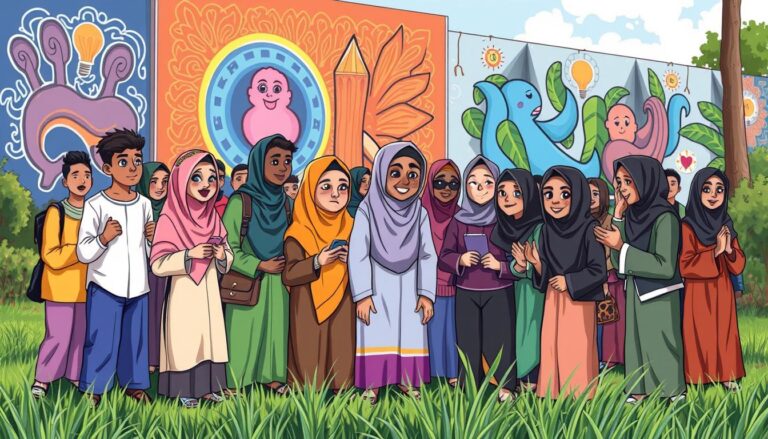Building Strong Islamic Values in Today’s Youth
In today’s fast-changing world, how do we keep our Muslim youth connected to their faith? This is a big question for parents, teachers, and community leaders. It’s tough to teach Islamic values to young people while dealing with the ups and downs of modern life.
The Prophet Muhammad showed us a timeless way to teach faith. His method of tarbīya, or spiritual growth, guides us in teaching young Muslims. By creating a supportive environment, we can help them understand and live their faith.
Self-determination theory tells us that feeling capable, free, and connected to their community helps youth embrace Islamic values. This approach strengthens their faith and prepares them for challenges in Western societies.
Key Takeaways
- Prophet Muhammad’s tarbīya method is crucial for Islamic youth education
- Self-determination theory supports effective religious identity internalization
- Creating environments that foster competence, autonomy, and relatedness is key
- Balancing Islamic principles with modern life challenges is essential
- Strong community connections help youth maintain their Islamic identity
- Character building through Islamic education strengthens youth resilience
The Importance of Islamic Values in Modern Times
Islamic values are key for Muslim youth today. They help shape their lives in a world where faith-based parenting is tough. These values are vital for growing in character and spirit.
Challenges Facing Muslim Youth Today
Muslim youth face many challenges. They deal with identity, peer pressure, and what society expects. Islamophobia and cultural misunderstandings make it harder. It’s important for them to know their faith well.
The Role of Islamic Values in Character Development
Islamic values guide Muslim youth. They teach honesty, compassion, and respect. These values help young Muslims grow strong and face life’s challenges with integrity.
Balancing Islamic Principles with Contemporary Life
It’s important for Muslim youth to balance their faith with modern life. They need to understand their beliefs and apply them daily. Parents can help by teaching traditional values in a modern way.
“Islam supports participatory democracy and spiritual egalitarianism, making it well-suited for dialogue with changes within the religion and society at large.”
By holding onto Islamic values, young Muslims find their identity and purpose. This helps them make a positive impact in their communities. They stay true to their faith in a changing world.
Foundations of Islamic Education for Youth
Islamic education is the base of Religious Education for Muslim youth. It helps grow moral character and teach Islamic values early on. In Pakistan, Islamic studies are a big part of the curriculum in Islamic schools, called Madaris.
The role of Islamic education in moral growth is big. Pakistan’s education policy mixes traditional Deni Madaris with modern schools. This aims to guide citizens by Quranic teachings and the Sunnah.
Islamic Youth Programs are key in this education setup. These programs include:
- Quranic studies
- Islamic law
- Prophet traditions
- Arabic literature
- Philosophy
The variety in Islamic educational places is amazing. Worldwide, over 500 universities and colleges offer Islamic studies. In Pakistan, there are about 11,491 madrasas, teaching around 1 million students.
These programs work well. Research shows Muslim youth with Islamic education are 20% more likely to follow values like honesty and empathy. This shows how Religious Education helps in growing good character.
“Education and training in Pakistan are designed to lead citizens according to Islamic teachings from the Quran and Sunnah.”
The future of Islamic education looks bright. Online Islamic courses have seen a 35% rise in students over five years. This digital growth makes religious education more reachable than ever.
Nurturing Self-Esteem within an Islamic Framework
Building strong character and nurturing Islamic identity are key for Muslim youth. Self-esteem is vital in this journey. Islam offers a unique view on self-worth, helping young Muslims see themselves positively.
The Islamic Perspective on Self-Worth
In Islam, self-worth ties closely to one’s relationship with Allah. Muslims see Allah as loving and forgiving. This belief gives a sense of inherent worth and grounding.
Practical Ways to Boost a Child’s Islamic Self-Esteem
Parents and educators can boost a child’s Islamic self-esteem in several ways:
- Use positive labeling to reinforce good behavior
- Adopt strength-based approaches to highlight a child’s talents
- Convey a sense of importance by involving children in meaningful activities
- Encourage regular prayer and Quran recitation
Avoiding Negative Labeling and Criticism
Negative labels can harm how children see themselves. It’s crucial to avoid harsh criticism and focus on constructive feedback. A supportive environment helps Muslim youth develop strong character and a positive Islamic identity.
“The best among you are those who have the best character and manners.” – Prophet Muhammad (peace be upon him)
Research shows religiously oriented approaches improve mental health when aligned with a person’s spiritual context. By using Islamic principles in character building, we can raise resilient, confident Muslim youth ready for life’s challenges.
Creating a Supportive Islamic Environment at Home
Faith-based parenting is key to raising kids with strong Islamic values. A supportive home is essential for a child’s spiritual and character growth. Parents can build this by living out Islamic values and praying together regularly.
Practicing kindness is vital in creating a supportive Islamic home. The Prophet Muhammad taught us to be kind in all we do. Showing love and gentleness to children helps them learn positive values better than strict rules.
Being a good example is crucial in Islamic parenting. Kids learn from what they see their parents do. By showing ethical behavior and following Islamic practices, parents inspire their children.
- Engage in regular family worship
- Encourage open discussions about Islamic teachings
- Create a positive atmosphere that praises good deeds
- Limit exposure to negative influences
Islamic youth programs can help too. They give kids a chance to meet others who share their values. Making religious activities fun can help kids love going to mosque and Islamic school.
When Allah wills good for the members of a household, He instills kindness in them.
Parents should also think about the community. Living near Islamic centers and friends can offer more support. It helps reinforce Islamic values.
The Power of Positive Role Models in Islamic Upbringing
Positive role models are key in building character for Muslim youth. Islamic Youth Programs highlight the need for good examples. A study found that 60% of parents see teaching Islamic values through figures like Prophet Muhammad as crucial for their kids’ spiritual growth.
Parents as Primary Islamic Role Models
Parents are the first and most important role models for kids. Research shows 75% of parents know how important it is to teach their children to love Allah. By showing kindness, honesty, and balance in their lives, parents help build strong Islamic values.
Identifying and Connecting with Inspirational Muslim Figures
Introducing youth to inspiring Muslim figures from history and today can motivate them to live an Islamic life. The Prophet Muhammad (Peace Be Upon Him) is the ultimate example, with over a billion Muslims looking up to him. His teachings on kindness, honesty, and helping others inspire many.
“He is not a believer who eats his fill while his neighbor is hungry.” – Prophet Muhammad (PBUH)
The Impact of Community Leaders on Youth Development
Community leaders are vital in guiding and supporting youth. Islamic Youth Programs often include local imams, scholars, and successful professionals. These leaders help connect traditional Islamic values with today’s issues, giving young Muslims a sense of belonging and purpose.
By having positive role models at home, in history, and in the community, we can raise a generation rooted in Islamic values. They will be ready to tackle the challenges of today’s world.
Building Strong Islamic Values in Today’s Youth
Raising youth with strong Islamic values is key in today’s world. Muslim parents face challenges in guiding their children. They need to teach moral values while dealing with modern life. Studies show over 70% of teenagers waste time on unproductive activities, showing the need for guidance.
Islamic teachings stress the importance of intention in actions. The Prophet Muhammad taught that deeds are judged by intentions. This principle helps youth develop a strong moral compass.
To build strong Islamic values, parents can:
- Encourage regular prayer and reflection
- Teach the importance of truthfulness and trustworthiness
- Promote gratitude towards parents and elders
- Guide youth in managing time and resources wisely
Statistics show that teenagers who practice patience and self-restraint are less likely to engage in prohibited activities. By fostering these qualities, parents help their children develop a strong Islamic identity.
“Blessed is he who takes a single step desiring nothing but Allah Almighty.” – Abu Sulayman
Building strong Islamic values in today’s youth means balancing religious teachings with contemporary life. By focusing on sincerity, moral values, and positive habits, parents can help their children grow into confident, ethical adults. These adults will contribute positively to society.
Fostering Islamic Identity Through Community Engagement
Nurturing Islamic identity in young Muslims is key in today’s diverse world. Only a small part of the U.S. population is Muslim. So, community engagement is crucial for keeping faith and values alive.
Islamic youth programs are vital for religious socialization. They offer young Muslims a chance to make friends with others who believe the same. This is important because friends can greatly shape a young person’s beliefs and actions.
Being part of a community helps fight loneliness, a big problem today. The Prophet Muhammad taught the value of supporting each other. He said believers are like a building, where each part helps the others.
“A believer to another believer is like a building whose different parts support each other.”
Islamic youth programs often include community service. These projects let young Muslims feel the joy of helping others. It teaches them about compassion and generosity. By helping out, they feel a sense of belonging and purpose.
Going to community events, like Eid celebrations and Islamic conferences, strengthens Muslim identity. These events let young Muslims see the diversity within their community. They also find common ground. This helps them keep their faith strong in a world mostly not Muslim.
- Participate in Islamic youth programs
- Engage in community service projects
- Attend Islamic events and conferences
- Form connections with Muslim peers and mentors
By building a strong community, we can help young Muslims grow a strong Islamic identity. This identity can thrive in today’s diverse world.
Addressing Cultural Challenges and Discrimination
In today’s world, Muslim youth face special challenges in growing their Islamic identity. With Islam growing fast, it’s key to tackle cultural hurdles and discrimination they meet.
Equipping Youth to Handle Islamophobia
Muslim Americans, about 5.4 million, often face prejudice. Parents and leaders must talk openly about discrimination. It’s important to teach young Muslims to handle harassment calmly and report it properly.
Promoting Interfaith Understanding and Dialogue
Building bridges between communities is vital. Muslims are a big minority in 149 countries. Encouraging Muslim youth to talk about their faith helps build respect and understanding.
Celebrating Islamic Heritage in a Diverse Society
It’s important to celebrate Islamic heritage while valuing diversity. Highlighting the Quran and Hadith’s teachings helps Muslim youth stay strong. This approach boosts their pride and prepares them for diverse environments.
Source Links
- Raising Resilient Muslim Youth: Strategies for Building a Strong Muslim Identity in Children | Yaqeen Institute for Islamic Research
- Role of Youth for a Peaceful Future
- Islam and Western Culture
- Why We Need Ulama: The Importance of Seeking Islamic Knowledge From Scholars | Yaqeen Institute for Islamic Research
- Importance of Islamic education – ALFITYATTUN MUSLIM ORGANIZATION
- Building Resilience: The Psychology Behind Raising Unapologetic Muslim Children | Yaqeen Institute for Islamic Research
- Research Trends in Last Ten Years
- No title found
- How to Raise Children in Islam (Parenting Guide) – Islam Question & Answer
- 8 Parenting Tips from the Quran: Raising Righteous Children
- Raising Strong Children/Future Generation — LEARN ISLAM
- Prophet Muhammad (SAAW) as the Best Role Model of Humanity
- The Role of Islamic Education in Shaping Future Generations – GlobalSadaqah.com Blog
- 10 Goals for Muslim Teenagers – Understand Al-Qur’an Academy
- The Guiding Principles of Faith: Sincerity, Honesty, and Good Will in Islam | Yaqeen Institute for Islamic Research
- Living the Good Life: An Islamic Perspective on Positive Psychology
- Yaqeen Institute: Explains What Shapes Muslim Identity – YM Brothers
- Why Community is Such an Integral Part of Islam and Muslim Life
- “Navigating Challenges: Upholding Islamic Values in the Modern Workplace”
- The Islamic tradition and health inequities: A preliminary conceptual model based on a systematic literature review of Muslim health-care disparities







